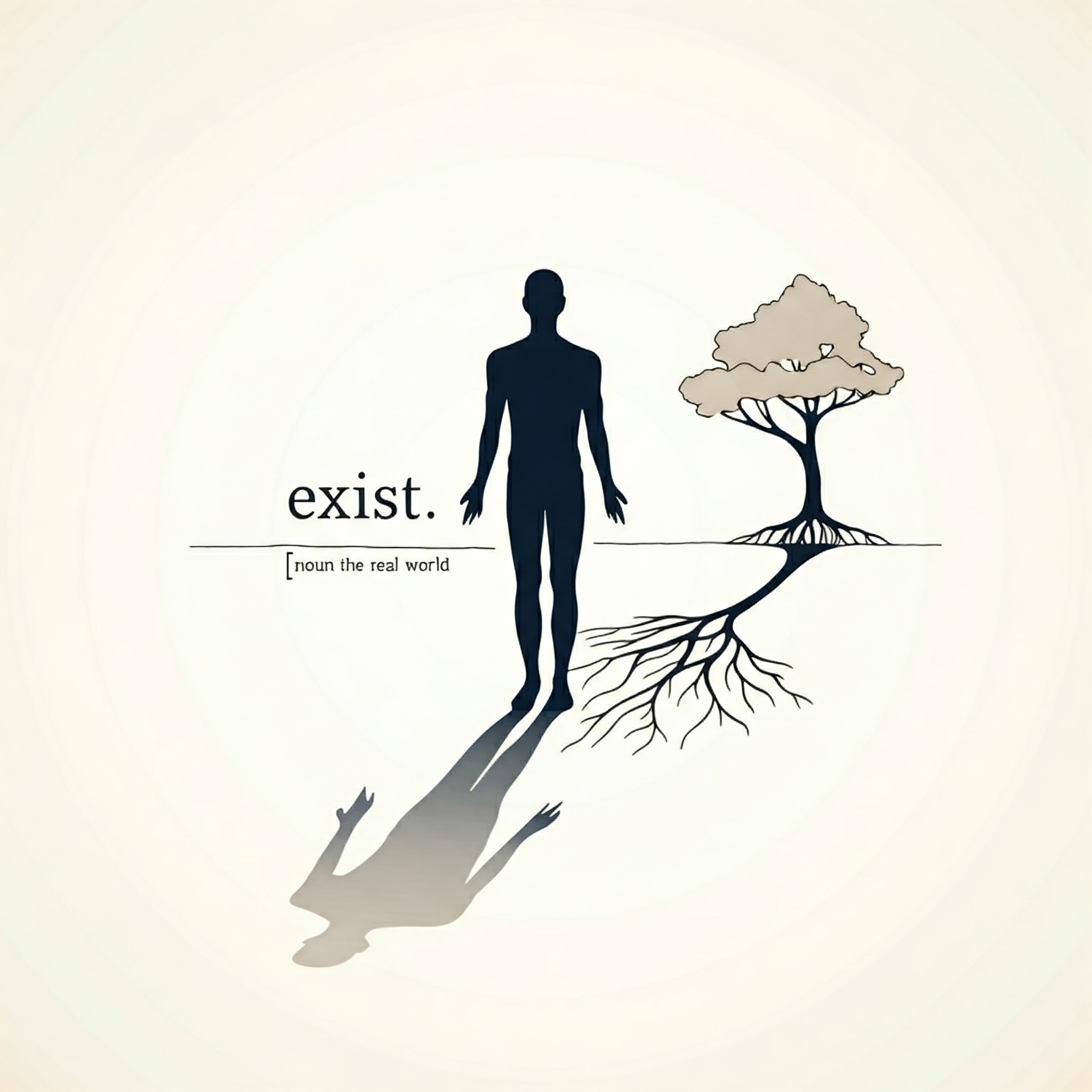Exist
Definition
Exist is a verb that means to have actual being or to be real. It can also refer to being alive, present, or in a particular state or place.
Parts of Speech
- Verb
Pronunciation
American English
- IPA Pronunciation: /ɪɡˈzɪst/
- Respelling: ig-ZIST
British English
- IPA Pronunciation: /ɪɡˈzɪst/
- Respelling: ig-ZIST
Etymology
The word "exist" originates from the Latin "existere" or "exsistere," which means "to stand out" or "to appear." This is derived from "ex-" (out of) and "sistere" (to stand or to be). The term entered English in the late 16th century, gaining the meaning of "having presence" or "being real."
Derivatives
- Existence (noun)
- Existent (adjective)
- Existential (adjective)
- Coexist (verb)
- Nonexistence (noun)
Synonyms
- Live
- Be
- Subsist
Antonyms
- Vanish
- Disappear
- Perish
Usage
The verb "exist" is widely used to describe being alive, real, or present, as in "Dinosaurs no longer exist" or "We exist within a complex universe." It often emphasizes presence or reality in philosophical, scientific, or everyday contexts.
Related Terms
- Reality: The state of being real or actual.
- Presence: The state of existing in a specific place or time.
- Life: The condition that distinguishes living things from inanimate objects.
Detailed Definitions
Verb
- To have actual being or to be real: Refers to the state of being present or existing in reality.
- Example: "Ancient civilizations existed long before modern times."
- To live or be alive: Describes the state of life or continued survival.
- Example: "Many creatures exist in the depths of the ocean."
- To be present in a particular place or condition: Indicates being within a certain state or situation.
- Example: "The company continues to exist despite financial challenges."
exist



🇨🇳 Mandarin (Chinese)
- 存在 (cúnzài)
- IPA Pronunciation: /t͡shʰwən˧˥ tsai˥˩/
- Respelling: chwun-zai
🇮🇳 Hindi
- मौजूद होना (maujūd honā)
- IPA Pronunciation: /moːd͡ʒuːd ɦoːnɑː/
- Respelling: mo-jood ho-naa
🇪🇸 Spanish
- existir
- IPA Pronunciation: /egˈsistir/
- Respelling: ehg-sees-teer
🇫🇷 French
- exister
- IPA Pronunciation: /ɛgziste/
- Respelling: ex-ees-tay
🇸🇦 Modern Standard Arabic
- وجد (wajada)
- IPA Pronunciation: /wad͡ʒada/
- Respelling: wa-jada
- موجود (mawjūd)
- IPA Pronunciation: /mawˈd͡ʒuːd/
- Respelling: maw-jood
🇧🇩 Bengali
- অস্তিত্ব থাকা (ôstitto thākā)
- IPA Pronunciation: /ɔstitːɔ t̪ʰaka/
- Respelling: os-tit-to tha-ka
🇷🇺 Russian
- существовать (sushchestvovat')
- IPA Pronunciation: /sʊˈʂɛstvəvətj/
- Respelling: soo-shchest-vuh-vat
🇵🇹 Portuguese
- existir
- IPA Pronunciation: /iʃˈziʃtiɾ/
- Respelling: eesh-zeesh-teer
🇮🇩 Indonesian
- ada
- IPA Pronunciation: /ada/
- Respelling: ah-da
🇩🇪 German
- existieren
- IPA Pronunciation: /ɛksɪsˈtiːʁən/
- Respelling: ex-is-teer-en
🇯🇵 Japanese
- 存在する (sonzai suru)
- IPA Pronunciation: /sonzai suru/
- Respelling: son-zai su-ru
🇻🇳 Vietnamese
- tồn tại
- IPA Pronunciation: /tʌn˧˥ tai˧˥/
- Respelling: ton tai
🇰🇷 Korean
- 존재하다 (jonjaehada)
- IPA Pronunciation: /d͡ʑond͡ʑεhada/
- Respelling: jon-jae-ha-da
🇹🇷 Turkish
- var olmak
- IPA Pronunciation: /vaɾ olmak/
- Respelling: var ol-mak
🇵🇰 Urdu
- موجود ہونا (mawjūd honā)
- IPA Pronunciation: /moːd͡ʒuːd ɦoːnɑː/
- Respelling: mo-jood ho-naa





